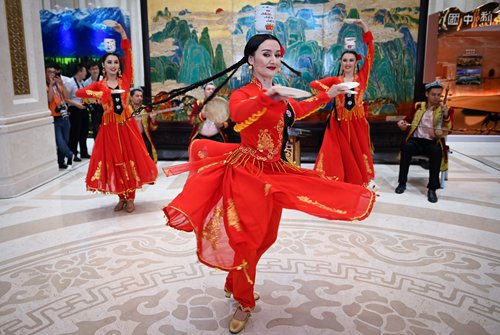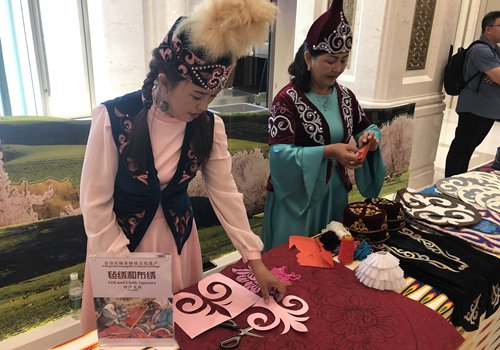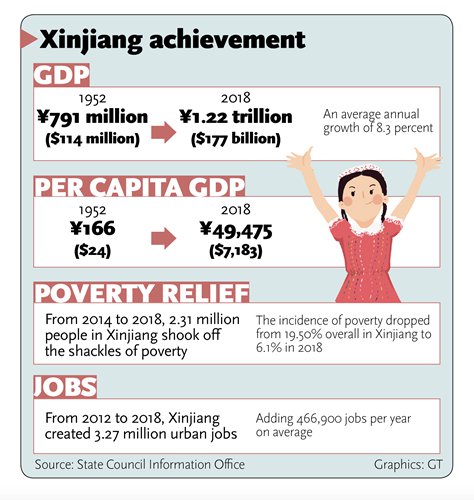HOME >> CHINA
90% of Xinjiang center graduates get good jobs
By Liu Xin and Xie Wenting Source:Global Times Published: 2019/7/30 22:38:40

Ethnic minority artists perform a traditional dance before officials hold a press conference for Northwest China's Xinjiang Uyghur Autonomous Region on Tuesday in Beijing. Photo: AFP
Northwest China's Xinjiang Uyghur Autonomous Region has set up and run vocational education and training centers in accordance with laws with trainees' individual rights fully protected, and most trainees have returned home, senior officials from Xinjiang said Tuesday.
During their stay at the centers, trainees' rights are fully protected, Alken Tuniaz, a member of the Standing Committee of the Communist Party of China (CPC) Xinjiang Committee and vice-chairman of Xinjiang regional government, said at a press conference in Beijing on Tuesday.
No one is mistreated, Alken said. Trainees are free to use the language and to live in the habit of their own ethnic groups.
"Xinjiang sets up and runs these training centers in accordance with laws and regulations. The centers were established as a countermeasure after violent attacks rattled Xinjiang and the 'three evil forces' started spreading extremism disguised as religion," Shohrat Zakir, deputy secretary of the CPC Xinjiang Committee and chairman of Xinjiang government, said at the conference on Tuesday.
The "three evil forces" to which Shohrat referred to are terrorism, extremism and separatism.
He added that by drawing lessons from other countries' successful counter-terrorism and de-radicalization measures, Xinjiang set up the centers aiming to save people influenced by extremist ideas.
Questions about the centers were raised during the conference held by the State Council Information Office Tuesday to unveil the economic and social developments of the region.
Shohrat said that China's Xinjiang is located in the geographic center of Asia bordering eight countries. Some Central Asian countries have suffered greatly from terrorism in recent years, he noted. Meanwhile some overseas forces have attempted to collude with extremists and terrorists in China's Xinjiang to achieve their political goals.
Shohrat said that trainees at these centers are learning about the law so they can be aware of their basic rights, obligations, and responsibilities as a Chinese citizen. They are also taught standard Chinese to better integrate into society along with lessons on practicing their religion in accordance with the law.
More than 90 percent of the trainees who graduated from these centers secured stable jobs and are living a happy life, he added.
Many of the training centers in Xinjiang have also started offering short-term employment training to farmers.
Spokespersons from the Chinese Foreign Ministry and the State Council Information Office reiterated the information concerning these training centers. Setting these centers is an effective way of de-radicalization and curbing the menace of terrorism, Alken said.
Alken noted that many people from other countries including scholars, diplomats and religious personnel, have visited Xinjiang's training centers and talked to trainees. They expressed their understanding and support for Xinjiang's experience in counter-terrorism and de-radicalization work.

Artists from Northwest China's Xinjiang Uyghur Autonomous Region show visitors some traditional ethnic minority costumes in the hall where a press conference was held by the State Council Information Office in Beijing on Tuesday. Photo: Liu Xin/GT
Open to world
Fifty ambassadors to the UN at Geneva (UNOG) last week co-signed a letter to the president of the UN Human Rights Council (HRC) and the Office of UN High Commissioner for Human Rights (OHCHR) to voice their support for China's governance in Xinjiang.
Iran is one of the 50 countries. According to an exclusive statement sent to the Global Times by the Embassy of Iran to China, Iran "strongly rejects the unacceptable practice of some Western countries towards China and application of double standards and abuse of human rights under the pretext of minority situation in this country," read the statement.
"Human rights have no greater adversaries than those who abuse it as instrument in their foreign policy toolbox, and the same destructive forces have done everything to suppress or derail independent nations like Iran and China."
Abdelhalim Elwardany, an Egyptian journalist who went to Xinjiang in January, said that he visited five training centers during his trip to Xinjiang and saw how trainees learn standard Chinese, laws and vocational skills.
No student is tortured in the centers as reports by human rights organizations claimed, Elwardany said, noting that the Chinese government has made great efforts in de-radicalization work and has taken care of their livelihood by offering them jobs.
Li Wei, a counter-terrorism expert at the China Institute of Contemporary International Relations in Beijing, told the Global Times that "the achievements of China's Xinjiang policies on counter-terrorism and de-radicalization work have given the confidence to China to take more active moves in dealing with concerns from the international community.
China is more open to the world by inviting more foreign groups and media to visit the region and to witness the achievements in Xinjiang with their own eyes, said experts.
Setting up training centers in Xinjiang is one method of de-radicalization work, Li said. The regional government has also paid attention to developing the local economy and improving residents' livelihood, which fits into requests to protect human rights,
At the Tuesday press conference in Beijing, senior officials from Xinjiang also introduced the region's economic and social development in the past 70 years.

Graphics: GT
In Xinjiang, regional GDP rose from 791 million yuan in 1952 to 1.22 trillion yuan in 2018, an average annual growth of 8.3 percent. From 2014 to 2018, 2.31 million people including 1.89 million from southern Xinjiang, shook off the shackles of poverty.
Xinjiang plans to speed up developing border ports and increase the region's openness. The region plans to attract foreign businesses and investment to develop labor-intensive industries, including textile and clothing industry, e-commerce and commercial logistics, Zhang Chunlin, member of the Standing Committee of the CPC Xinjiang Committee and executive vice-chairman of Xinjiang government said on the Tuesday press conference.
Alken also said on Tuesday that the current stable situation in Xinjiang has benefited Xinjiang's tourism sector. The number of trips to Xinjiang is expected to surpass 200 million this year.
At the Tuesday press conference, senior officials from Xinjiang repeatedly welcome people and foreign media reporters to visit Xinjiang and see local development with their own eyes.
Posted in: SOCIETY